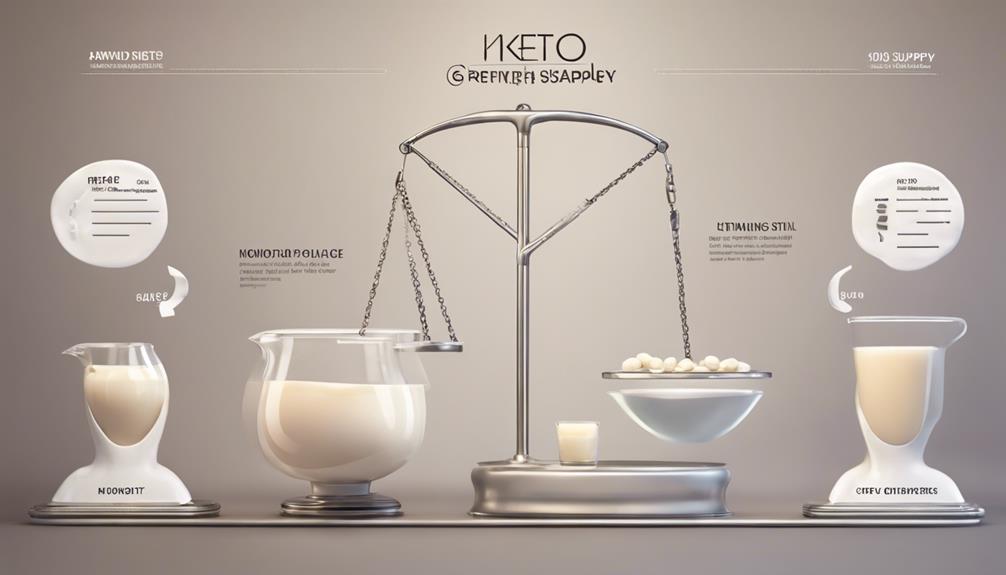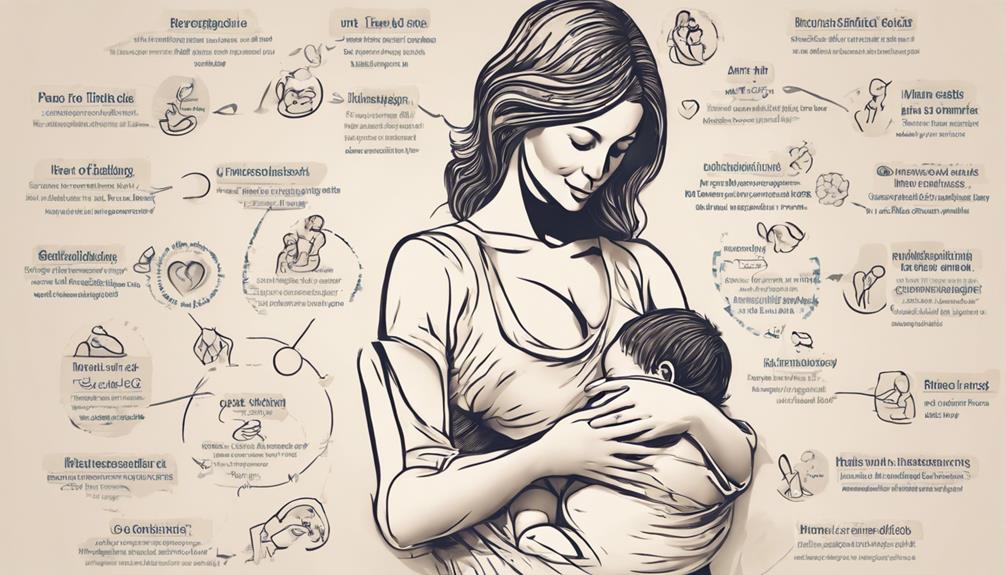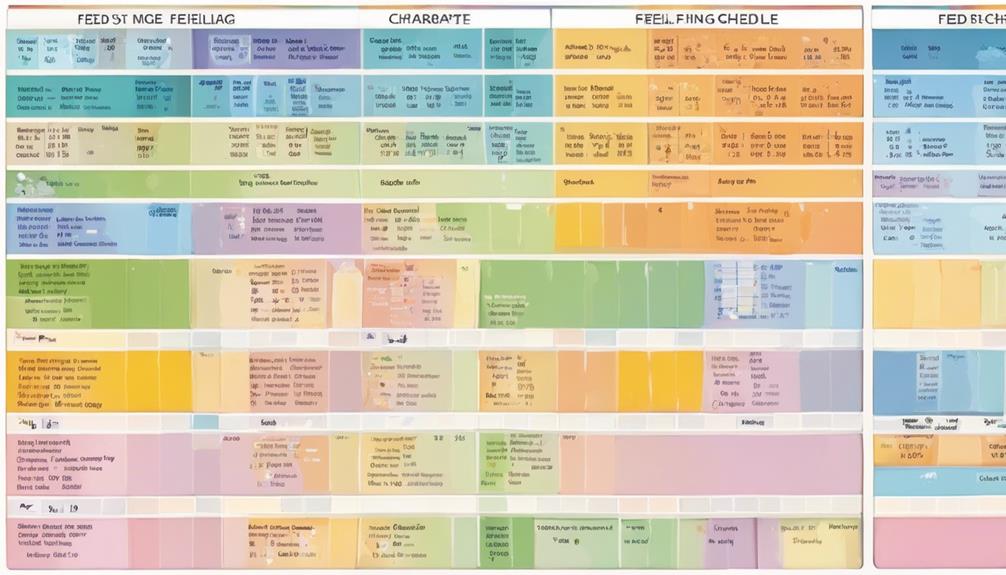As we navigate the world of keto diets and breastfeeding, deciphering fact from fiction amidst the plethora of information available is crucial.
While the buzz around this dietary approach is undeniable, the impact on nursing mothers and their little ones is a critical consideration that requires thoughtful examination.
The interplay between the keto diet and breastfeeding is a multifaceted topic that demands attention, especially when it comes to the well-being of both mother and child.
Join us as we unravel the complexities and shed light on what truly matters when it comes to nourishing both body and baby.
Key Takeaways
- Monitor weight loss to safeguard milk supply.
- Stay hydrated to prevent dehydration affecting milk production.
- Ensure balanced nutrition for maternal and infant health.
- Consult healthcare provider for safe keto breastfeeding journey.
Safety Considerations for Keto and Breastfeeding
What safety considerations should be prioritized when combining the keto diet with breastfeeding?
When starting on the keto diet while breastfeeding, it's essential to make sure that the diet is nutritionally balanced to support both maternal health and adequate milk production. The keto diet, known for its high fat and low carbohydrate approach, can potentially impact weight, energy levels, and nutrient intake. Breastfeeding individuals need extra calories and nutrients to sustain milk production, making it critical to choose nutrient-dense foods within the confines of the keto diet.
Monitoring weight loss is important, as rapid or excessive weight loss can affect milk supply. The restricted nature of the keto diet may lead to lower calorie intake, potentially impacting energy levels needed for breastfeeding. Healthcare provider consultation before beginning the keto diet while breastfeeding is crucial to address individual needs, make certain adequate nutrient intake, and minimize the risk of ketoacidosis. By carefully selecting foods and closely monitoring both maternal and infant health, breastfeeding individuals can safely navigate the keto diet.
Impact on Milk Supply and Quality

Consuming a ketogenic diet while breastfeeding may potentially influence both the quantity and quality of breastmilk produced. Dehydration resulting from the keto diet can impact milk supply, emphasizing the importance of consuming an adequate amount of fluids.
Anecdotal reports suggest that the fat content in breastmilk may be higher when following a keto diet, possibly due to the increased fat consumption characteristic of this diet. It's vital for nursing mothers on a keto diet to make sure they're consuming enough calories and fluids to support milk production adequately.
However, the impact of the keto diet on milk supply and quality can vary among individuals, highlighting the need for personalized attention to this aspect. Monitoring hydration levels, caloric intake, and overall well-being is essential to sustain a healthy milk supply while following a keto diet.
Nutritional Needs for Nursing Mothers
Nursing mothers must pay close attention to their nutritional needs to adequately support both their own health and the production of breastmilk for their infants. It's essential to consume an additional 450-500 calories per day to meet the demands of milk production.
Protein, healthy fats, iron, zinc, and other micronutrients play a crucial role in a nursing mother's diet. Hydration is key for maintaining milk supply and overall well-being. Including a variety of whole foods such as fruits, vegetables, whole grains, and lean proteins can help meet these nutritional needs. Opting for nutrient-dense foods ensures that both the mother and baby receive essential nutrients.
While following a ketogenic diet may help you lose weight, it's vital to consider how it could affect your milk supply. Prioritizing a well-rounded diet that meets the increased nutritional requirements during breastfeeding is essential for the health of both the mother and the baby.
Potential Risks and Side Effects

Exploring the potential risks and side effects associated with the keto diet during breastfeeding reveals critical considerations for maternal health and infant well-being. When breastfeeding moms commence on a keto diet, several factors should be taken into account to make sure both the mother and baby's health:
- Ketosis Risk: Higher ketone levels in breastfeeding individuals can potentially lead to the risk of ketoacidosis.
- Nutrient Deficiencies: The calorie-restrictive nature of the keto diet may conflict with the increased calorie demands of breastfeeding, potentially causing nutrient deficiencies.
- Energy Levels: Side effects of the keto diet, such as fatigue and muscle loss, may impact breastfeeding moms' energy levels.
- Milk Supply: Dehydration from the keto diet can affect milk supply, putting breastfeeding at risk.
- Metabolic Demands: The metabolic demands of breastfeeding combined with the high-fat intake of the keto diet may increase the risk of ketoacidosis in breastfeeding women.
Considering these factors is critical when deciding to follow a keto diet while breastfeeding to make sure the well-being of both mother and child.
Practical Tips for Keto Success
When starting on the keto diet while breastfeeding, it's essential to implement practical tips for success to support both maternal health and infant well-being. Monitoring your daily macronutrient intake is important to make sure you're meeting the high-fat, moderate-protein, low-carb requirements of the diet.
Incorporate nutrient-dense foods like avocados, nuts, seeds, and leafy greens to meet your body's needs. Staying hydrated is key; drink plenty of water and electrolyte-rich beverages to counteract the dehydrating effects of ketosis.
Planning and prepping meals in advance can help you stick to the keto diet and avoid high-carb temptations. Listen to your body and adjust your diet as needed to support energy levels, milk supply, and overall well-being while breastfeeding.
Frequently Asked Questions
How Can I Do Keto Without Losing My Milk Supply?
We prioritize maintaining milk supply while on keto. Stay hydrated, eat enough calories, and consult a healthcare provider to make sure safety. Focus on nutrient-dense foods for milk production and ketosis. Monitor for any changes in supply or baby's behavior.
Are Babies in Ketosis on Breast Milk?
Babies are not in ketosis when breastfed as breast milk provides essential carbohydrates. Lactose in breast milk prevents ketosis in infants. Ketosis in babies is discouraged due to their metabolic needs. Breast milk provides crucial nutrients for their growth and development.
Is Keto Good for Postpartum?
We've found that the keto diet may not be the best for postpartum individuals due to increased calorie needs while breastfeeding. Consult with healthcare providers for personalized advice, as a balanced diet rich in nutrients is generally recommended for postpartum recovery.
Do You Need Carbs While Breastfeeding?
Yes, we need carbs while breastfeeding. Carbohydrates are essential for energy and milk production. They help maintain milk supply and provide important nutrients. Balancing carbs is important for sustaining milk production and ensuring overall health for both mom and baby.
Conclusion
In the dance of keto and breastfeeding, balance is key.
Nourishing both body and baby, we must tread carefully.
Remember, the path to health isn't a sprint, but a steady journey.
Seek guidance, listen to your body's song, and embrace the harmony of nutrition and nurture.
Let wisdom be your guide, and may your steps be light as you navigate this intricate waltz of well-being.









